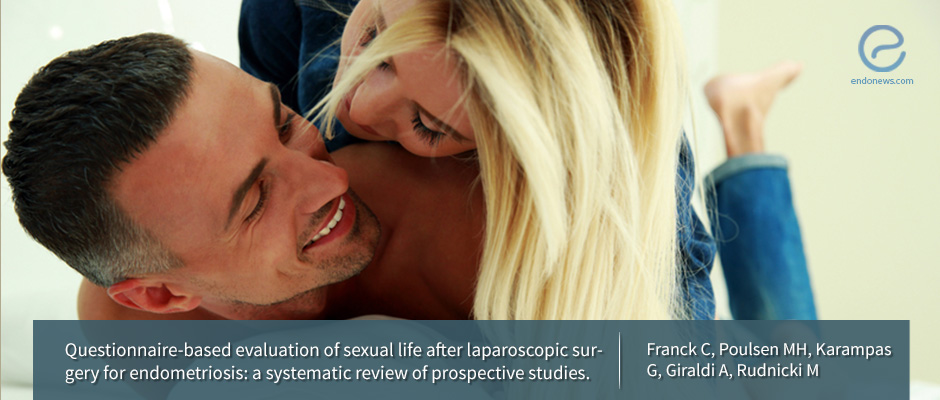Questionnaire based evaluation of sexual life after laparoscopic surgery for endometriosis
Aug 24, 2018
Laparoscopic surgery improves sexual function in women with endometriosis.
Key Points
Highlights
- This study shows that laparoscopic surgery improves sexual function in women with endometriosis. The development of a new validated questionnaire, designed specifically for assessing sexual function in women with endometriosis, and randomized controlled trials using this new questionnaire are required.
Importance
- Most studies evaluating endometriosis treatment focus on pain relief as an indicator, therefore quality of sexual life (QoSL) is often overlooked. In addition, there is no universal questionnaire to evaluate the sexual function of women with endometriosis.
What’s Done Here
- This study is a systematic review conducted according to the “Preferred Reporting Items for Systematic Reviews and Meta-Analyses” (PRISMA) guidelines for systematic reviews.
- The authors evaluated the effect of laparoscopic surgery on QoSL in women with endometriosis by analyzing 12 studies including validated questionnaires.
- The study highlights the heterogeneity of questionnaires used by categorizing the included studies according to which questionnaire was used, and discusses which method could represent a holistic approach to evaluate QoSL in women with endometriosis, apart from the single use of a questionnaire.
Key Results
- Although the study finds that endometriosis negatively affects female sexual functioning, such as pleasure, frequency of sexual intercourse, comfort, desire, orgasm and satisfaction with sex, it shows treatment with laparoscopic surgery improves sexual function regardless of location, severity of the disease, and hormonal treatment.
Limitations of the Study
- Due to the heterogeneity among the included studies a meta-analysis could not be conducted.
- Only one questionnaire was developed specifically for the evaluation of women with endometriosis
- The included studies varied extensively regarding hormonal treatment, which may bias the effect of laparoscopy on QoSL
Lay Summary
Researchers from Denmark note that laparoscopic surgery is being increasingly used for the treatment of endometriosis due to its safety and effectiveness. However, treatment success is often evaluated through follow-up on the experience of pain, leaving other important aspects of the condition such as sexual function, overlooked. When sexual function is analyzed, it is done so through several different questionnaires, as there is no universal questionnaire to evaluate the sexual function of women with endometriosis.
This study evaluated the effect of laparoscopic surgery on quality of sexual life (QoSL) in women with endometriosis by conducting a systematic review of studies which include several different questionnaires. Overall, 12 studies were analyzed which used the Sexual Activity Questionnaire (SAQ), the McCoy Female Sexuality Questionnaire (MFSQ), the Sexual Health Outcomes in Women Questionnaire (SHOW-Q), the Endometriosis Health Profile questionnaire (EHP-30), the Sexual Function–Vaginal Changes questionnaire (SVQ), the Female Sexual Function Index (FSFI), and the revised Female Sexual Distress Scale (FSDS). Only one of these questionnaires, the EHP-30, is designed specifically for the evaluation of women with endometriosis. However, only a small section of five questions assesses sexual function.
The authors note that “substantial differences were found in study design, population, stage of endometriosis, operative intervention and use of preoperative/postoperative hormonal treatment”. Because of this, an overall meta-analysis could not be performed. Regardless, the study had valuable findings, showing that “endometriosis negatively affects several domains of female sexual functioning, such as pleasure, frequency of sexual intercourse, comfort, desire, orgasm and satisfaction with sex” and that laparoscopic surgery improves sexual function irrespective of location, severity of the disease and hormonal treatment, which is in line with findings from previous reviews. The authors note that although laparoscopic surgery provides such a benefit, patients must still be informed of the intraoperative and postoperative risks that accompany surgery.
This review finds that many studies evaluating sexual function had several methodological weaknesses and did not consider all possible factors that can influence sexuality. Based on these weaknesses, the authors advise that future studies should explore the impact of the type and severity of complications on QoSL and should follow-up with patients for a longer period of time due to the risk of recurrence of endometriosis symptoms. They also note that a key weakness of the questionnaires used within the studies was that they were not specifically designed for women with endometriosis, apart from EHP-30. In addition, the 12 included studies varied greatly regarding hormonal treatment making it difficult to determine whether improvements in QoSL is due to laparoscopic surgery or hormonal treatment. They recommend “well-designed randomized controlled trials comparing surgical with hormonal treatment” for future studies.
In conclusion, the authors advise the development of a new validated questionnaire, designed specifically for assessing sexual function in women with endometriosis, and randomized controlled trials using this new questionnaire are required.
Research Source: https://www.ncbi.nlm.nih.gov/pubmed/29754435
Endometriosis laparoscopy questionnaire sexual function systematic review

